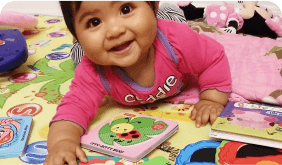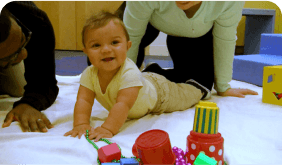Baby is constantly developing! Every few months (or even every few weeks!) comes with new development and baby’s changes. For many parents, these developments are exciting—and exhausting.

First, you’re trying to understand what baby wants. If baby is crying, you’re wondering, “Why is baby crying? Do they need food? Have a dirty diaper?” Then, when you learn what baby needs, a new challenge is thrown your way. Baby starts eating solids, or crawling, or walking, and it’s time to find answers to a whole new set of questions.
Baby is constantly developing and changing, which means parents need to figure out how to help them in a new way.
Feeling overwhelmed when caring for baby is common and expected. Being a caregiver for babies changes you in so many ways—including how your brain is wired! Mothers and fathers actually experience changes in their brain after welcoming baby, so they can protect and plan for their infants. This change helps parents bond with baby and care for them. The more caregiving tasks a parent takes on, the stronger the connection in the brain.

As parents become more connected and “tuned in” to baby’s changes and needs, they’re able to understand how to care for their child, and quickly learn what their child needs by being able to do things like reading nonverbal cues. Nonverbal cues are signals that we give to each other to communicate without speaking. For example, if baby reaches their arms up to you, they may be communicating that they want to be picked up without saying it. Then, as baby changes, parents need to “re-tune”—meaning you may have lots of new questions and things to learn. This can be challenging, confusing, and scary for parents.
So how can parents deal with constant baby’s changes? Here are some tips to help:
Focus on daily routines:
Whether it’s morning, evening, or during activities, like bath time, routines provide predictability. This will help to address baby’s needs. Learn baby’s patterns and predict what’s next.
Pay attention to baby’s milestones:
See what’s happening in the months ahead to prepare yourself for what’s next.
 Remember to take care of yourself, too:
Remember to take care of yourself, too:
Easier said than done, right? Taking care of baby takes lots of energy, and in their first few months they will wake you up every few hours. When you can, take some time to rest or do things that you enjoy. How can this happen?
If possible, work with your partner to share responsibilities.
Ask other family members to take care of baby for a few hours.
Try doing activities for your health with baby, like working out.
Talk about how you’re feeling:
It is ok if you are feeling overwhelmed! Sometimes, the best thing to do is speak to someone you trust about how you’re feeling, to see if you can find a way to make the situation better. You can speak to friends, family, or your own parents if you believe they can provide the support needed. If you’d prefer to speak to a professional, there are a few options! You can speak to baby’s healthcare providers to answer questions about baby’s care and development. You can also speak to counselors or other trusted advisors if you are feeling overwhelmed, confused, or any other challenging emotions. There is help all around!
Remember being a parent is hard work, and it’s ok to ask for help!
 Yes, being a parent is wonderful—but it’s hard too! It is ok if everything is not fun and happy all the time. You will learn and adjust, and there will be people along the way to help you with this. Even if it’s not your first baby, parenthood is always an adjustment. Give yourself time to understand baby. You’re both learning together, every day!
Yes, being a parent is wonderful—but it’s hard too! It is ok if everything is not fun and happy all the time. You will learn and adjust, and there will be people along the way to help you with this. Even if it’s not your first baby, parenthood is always an adjustment. Give yourself time to understand baby. You’re both learning together, every day!





